
Mannheim, May 04, 2020
In view of the ongoing coronavirus pandemic, the bioenergy industry demands extensions and exceptions for the financing and conversion of biogas plants. The demands are based on fears that due to the lack of human resources, transportation difficulties, and the interruption of international supply chains, it will not be possible to comply with the statutory deadlines for conversions and official appraisals. Moreover, difficulties could arise with regard to the supply of biogas plants with input substances. The demands to mitigate the impact for the bioenergy industry are backed by the German Federal Association for Bioenergy (BBE), the German Biogas Association (FvB), the Association of German Farmers (DBV), and the German Wood Energy Association (FVH).
Cabinet Decision on Six-Month EEG-Extension
Biogas plants deliver power and heat to local and remote locations. Bioenergy makes a significant contribution to the base supply especially in rural areas. To continue to ensure the ongoing supply even during the coronavirus pandemic, the statutory deadlines need to be extended. This especially applies to the deadlines pursuant to the German Renewable Energies Act (EEG), which is essential for the financing of investments in new plants and conversions. By extending the deadlines, the loss of remuneration claims due to late go-live or a late report by the environmental appraiser can be avoided.
A draft law on the “EEG-Corona-Extension” by the German cabinet at the end of April grants important deadline extensions for amendments to the EEG. The draft law provides a six-month extension of the official deadlines for EEG tenders and the transitional regulations for grid connection requirements according to the energy industry law. Hauptstadtbüro Bioenergie welcomes the law changes, as plant operators, manufacturers and project planners can thus operate under the original framework conditions and do not have to fear that their EEG-surcharge will be canceled. In order to enable the bioenergy industry to reliably implement all of their projects, the Hauptstadtbüro Bioenergie, which is borne by the four bioenergy associations, demands a permanent increase of the realization periods for new plants and existing plants that already receive subsidies to at least 36 months, or better to 54 months. The current periods for wood-fired power plants and biogas plants range from 18 to 24 months. In addition, the bioenergy associations are calling for an increase in the maximum bids as well as a further development of the special allowance class for manure fermentation. Also, according to the associations the cap of the flexibility bonus must be abolished or significantly raised in order to maintain participation attractive for plant operators.
Flexibility Bonus Despite Supply Bottlenecks
The coronavirus pandemic can cause difficulties in connection with the supply of substrates for biogas plants and wood-fired power plants. If an external transportation company is unable to deliver animal input substances such as liquid manure to the plant location on time, the plants may lose their claim to the liquid manure bonus due to the delay. According to the EEG, plants that use at least 30 percent liquid manure are entitled to the bonus. Plants that use this bonus but fall below the required minimum share lose the bonus for the entire remaining remuneration period. To circumvent this danger, which arises from acute supply bottlenecks as a result of the coronavirus crisis, older existing EEG minimum share exceptions could be further developed to accommodate quarantine situations. Additionally, instead of the yearly calculation, Hauptstadtbüro Bioenergie proposes a monthly calculation of the flexibility bonus for 2020 in order to buffer the impact of the coronavirus pandemic at an early stage.
Sustainable Generation of Energy from Biogas
Energy from biomass can make a significant contribution to sustainable energy supply. Currently, biogas offers the highest user benefit and the best utilization of the energy potential of biomass. The gas that accumulates as a by-product of numerous agricultural, food processing, and industrial processes serves as an energy source for power gensets with gas engines. With its product brands MWM and Cat, Caterpillar Energy Solutions offers biogas-optimized gas engines, complete plants, and container solutions for combined heat and power generation. The transformation of Germany’s energy market intensifies the need for flexible, needs-oriented power generation from controllable plants. Germany’s federal government supports operators who switch to flex operation with the flex bonus, enabling them to realize a higher yield potential by converting their plants.
Further information:
- Working paper of Hauptstadtbüro Bioenergie: Consequences of the restrictions due to the corona pandemic in the field of bioenergy plants and resulting need for action (PDF in German)
- Hauptstadtbüro Bioenergie (Website in German)
- MWM Power Plant Solutions for Agricultural Biogas Plants
- Press release: MWM Flex Cogeneration Power Plant for Biogas Plant in Lower Saxony Designated “Cogeneration Power Plant of the Month” of January
